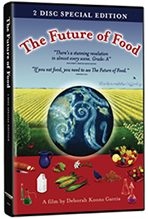The Future of Food
== The Future of Food ==
The future of food encompasses a wide range of innovations and trends that aim to address the challenges of feeding a growing global population, ensuring food security, and promoting sustainability. This topic includes advancements in agriculture, food technology, sustainability, and nutrition.
Agricultural Innovations[edit | edit source]
Agricultural innovations are crucial for increasing food production and efficiency. Key developments include:
- Precision agriculture: This involves the use of GPS, IoT, and big data to optimize farming practices, reduce waste, and increase yields.
- Vertical farming: Growing crops in vertically stacked layers, often in controlled indoor environments, to maximize space and resources.
- Genetically modified crops: Crops that have been genetically engineered to be more resistant to pests, diseases, and environmental conditions.
Food Technology[edit | edit source]
Food technology is transforming how food is produced, processed, and consumed. Notable advancements include:
- Lab-grown meat: Also known as cultured meat, this is produced by culturing animal cells in a lab, reducing the need for traditional livestock farming.
- Plant-based meat substitutes: Products made from plant proteins that mimic the taste and texture of meat, offering a sustainable alternative to animal products.
- 3D food printing: The use of 3D printing technology to create customized and complex food items.
Sustainability[edit | edit source]
Sustainability in food production and consumption is essential for reducing environmental impact and ensuring long-term food security. Key areas of focus include:
- Regenerative agriculture: Farming practices that restore soil health, increase biodiversity, and sequester carbon.
- Food waste reduction: Strategies to minimize food loss at all stages of the supply chain, from production to consumption.
- Alternative proteins: Sources of protein that have a lower environmental impact, such as insects, algae, and lab-grown meat.
Nutrition[edit | edit source]
Advancements in nutrition aim to improve public health and address malnutrition. Important trends include:
- Personalized nutrition: Tailoring dietary recommendations based on an individual's genetic makeup, lifestyle, and health status.
- Fortified foods: Foods that have been enhanced with additional nutrients to address specific dietary deficiencies.
- Functional foods: Foods that provide health benefits beyond basic nutrition, such as probiotics and omega-3 fatty acids.
Challenges and Considerations[edit | edit source]
While the future of food holds great promise, it also presents challenges and considerations:
- Ethical considerations: Issues related to the ethics of genetic modification, lab-grown meat, and animal welfare.
- Economic impact: The potential effects on traditional farming communities and the global economy.
- Regulatory frameworks: The need for updated regulations to ensure the safety and efficacy of new food technologies.
See Also[edit | edit source]
References[edit | edit source]
External Links[edit | edit source]
This article is a agriculture stub. You can help WikiMD by expanding it!
Transform your life with W8MD's budget GLP1 injections in NYC from $125 and up biweekly
W8MD offers a medical weight loss program NYC and a clinic to lose weight in Philadelphia. Our W8MD's physician supervised medical weight loss centers in NYC provides expert medical guidance, and offers telemedicine options for convenience.
Why choose W8MD?
- Comprehensive care with FDA-approved weight loss medications including:
- loss injections in NYC both generic and brand names:
- weight loss medications including Phentermine, Qsymia, Contrave, Diethylpropion etc.
- Accept most insurances for visits or discounted self pay cost.
- Generic weight loss injections starting from just $125.00 for the starting dose
- In person weight loss NYC and telemedicine medical weight loss options in New York city available
Book Your Appointment
Start your NYC weight loss journey today at our NYC medical weight loss, and Philadelphia and visit Philadelphia medical weight loss Call (718)946-5500 for NY and 215 676 2334 for PA
Search WikiMD
Ad.Tired of being Overweight? Try W8MD's NYC physician weight loss.
Semaglutide (Ozempic / Wegovy and Tirzepatide (Mounjaro / Zepbound) available. Call 718 946 5500.
Advertise on WikiMD
|
WikiMD's Wellness Encyclopedia |
| Let Food Be Thy Medicine Medicine Thy Food - Hippocrates |
Translate this page: - East Asian
中文,
日本,
한국어,
South Asian
हिन्दी,
தமிழ்,
తెలుగు,
Urdu,
ಕನ್ನಡ,
Southeast Asian
Indonesian,
Vietnamese,
Thai,
မြန်မာဘာသာ,
বাংলা
European
español,
Deutsch,
français,
Greek,
português do Brasil,
polski,
română,
русский,
Nederlands,
norsk,
svenska,
suomi,
Italian
Middle Eastern & African
عربى,
Turkish,
Persian,
Hebrew,
Afrikaans,
isiZulu,
Kiswahili,
Other
Bulgarian,
Hungarian,
Czech,
Swedish,
മലയാളം,
मराठी,
ਪੰਜਾਬੀ,
ગુજરાતી,
Portuguese,
Ukrainian
Medical Disclaimer: WikiMD is not a substitute for professional medical advice. The information on WikiMD is provided as an information resource only, may be incorrect, outdated or misleading, and is not to be used or relied on for any diagnostic or treatment purposes. Please consult your health care provider before making any healthcare decisions or for guidance about a specific medical condition. WikiMD expressly disclaims responsibility, and shall have no liability, for any damages, loss, injury, or liability whatsoever suffered as a result of your reliance on the information contained in this site. By visiting this site you agree to the foregoing terms and conditions, which may from time to time be changed or supplemented by WikiMD. If you do not agree to the foregoing terms and conditions, you should not enter or use this site. See full disclaimer.
Credits:Most images are courtesy of Wikimedia commons, and templates, categories Wikipedia, licensed under CC BY SA or similar.
Contributors: Prab R. Tumpati, MD




